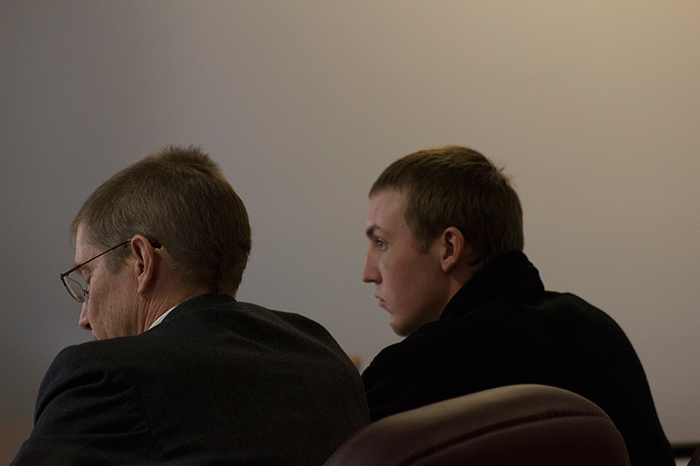
Dalton Dale Williams will face second-degree murder charges for the death of UW student Joseph McGowan. Despite a state Supreme Court ruling narrowing the requirements for second-degree murder in the state, handed down the day before Williams was arrested and charged with second-degree murder, Circuit Court Judge Robert Castor has bound the case to District Court under the charge of second-degree murder.
Under the new definition of second-degree murder, following the Supreme Court’s opinion on the case of Wilkerson v. Wyoming, an elevated level of recklessness indicating maliciousness must be present. Castor said the new elements required for that charge are present in this case. Williams, 21, delivered a single punch to McGowan, 21, during a fight at a house party and McGowan experienced blunt force trauma that would claim his life. During his testimony, Mitchell Cushman of the Laramie Police Department said witnesses indicate McGowan was not acting out aggressively and in fact, trying to stop the fight. Castor said this fit the state’s requirements.
“One blow can dictate maliciousness,” Castor said. “This court does find that there is probable cause to believe maliciousness has been presented.”
Castor concluded by saying Williams “probably” did commit second-degree murder in this case. Due to factors including Williams’s saying he had no reason to hit McGowan during an interview with Cushman and the lack of provocation on McGowan’s part, Castor said the evidence was present.
Williams’s attorney, Thomas Smith of Casper, said the evidence would show the incident did not “go past one blow” and the Wilkerson decision indicated a single punch could not constitute malice to justify second-degree murder charges.
“This isn’t a case of an MMA fighter hitting a 70-year-old lady,” Smith said. ” There’s no malice as a forethought and no ill will. The Wilkerson case changed the elements.”
County Attorney E. Kurt Britzius said factors in the case made the burden on the state to prove Williams committed second-degree murder “very low.” Factors including McGowan’s motivation during the incident, as well as Williams’s physical stature were evidence of an elevated level of recklessness.
Cushman, the only witness called to testify, said McGowan was only outside the party where a fight took place to deliver a phone charger to a friend waiting in his truck outside. He also testified to Williams having a larger physical stature than McGowan, where Williams is 6’2” and weighs 190 pounds while McGowan stood 5’7” and weighed 140 pounds. During interview with Cushman, WIlliams said he knew he had punched McGowan so hard he had knocked him out.
“Hitting someone with that force with no threat for no good reason shows recklessness with an extreme me indifference to human life,” Britzius said.
An alternative charge of manslaughter is included in the state’s case, and Castor said the court found evidence to support either one. Manslaughter, a less serious charge with a lighter sentence, only requires an ordinary degree of recklessness, while second-degree murder prescribes the defendant acted maliciously. Britzius said the alternative charge would be applied if the second-degree murder charge does not hold up in court.
“Its almost like having two separate charges, but with one count,” Britzius said. “The manslaughter charge will be present regardless.”
During his testimony, Cushman said Williams “was shocked” when he was informed McGowan had been seriously injured from the punch. WIlliams’s friend who was involved in the fight that ended in McGowan’s death, Austin Brachtenbach, said “it would not surprise him” if WIlliams had been involved in a fight.



